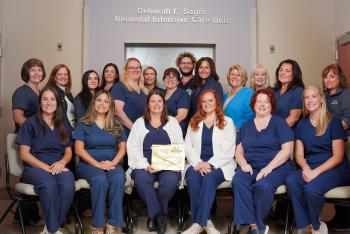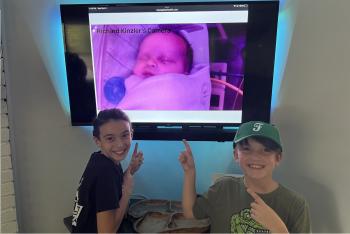The American Association of Critical-Care Nurses (AACN) has awarded Inspira Health's Deborah F...
Read More

When a baby is born, doctors screen for dozens of newborn health conditions, including jaundice. Although jaundice is common and usually goes away on its own, some babies require treatment. Understanding this condition can help you know what signs to look for, ensuring your baby gets proper care.
Jaundice is the yellow coloring in a newborn or infant’s skin, which signifies elevated bilirubin levels in the blood. “Bilirubin is a substance the body produces when red blood cells break down,” said Pratyusha Katta, M.D., Nemours pediatrician and chief pediatric hospitalist at Inspira Medical Center Vineland. “Since babies are born with a high concentration of red blood cells, they produce high rates of bilirubin.”
Up to 60 percent of full-term babies develop jaundice during the first week of their life. While most instances are not critical, severe cases can lead to brain damage if left untreated.
There are different types of newborn jaundice: physiological jaundice, breastfeeding jaundice, and breast milk jaundice
Physiological jaundice, the most common form of newborn jaundice, is relatively harmless. “Physiological jaundice occurs when a baby can’t metabolize the excess bilirubin in their system,” said Dr. Katta. “This is usually because their liver needs more time to develop.” In such cases, the condition resolves itself within one to two weeks.
Breastfeeding jaundice happens when the baby doesn’t receive enough breast milk due to nursing difficulties or issues with milk supply. Suboptimal milk intake can cause the reabsorption of bilirubin in the baby’s intestines. It can also hinder the passage of meconium, which is a newborn’s first stool, leading to an increase in bilirubin levels. While many cases resolve once breastfeeding is established, some instances require medical intervention.
Breast milk jaundice is different from breastfeeding jaundice. Its exact cause is unknown, but it’s thought to occur when substances in the mother’s breast milk prevent the baby’s liver from processing bilirubin. Breast milk jaundice can take several weeks to resolve and requires the support of a medical care team.
Most cases of newborn jaundice need some level of medical support but resolve naturally. “As the baby’s liver develops, its ability to process bilirubin progresses,” said Dr. Katta. “Feeding your baby every two to three hours can encourage bowel movements, which helps the newborn get rid of excess bilirubin.”
If bilirubin levels are higher than normal, your doctor may recommend phototherapy, a blue light treatment that helps the baby’s liver eliminate excess bilirubin. In rare instances, your doctor may recommend a blood transfusion. As every case is unique, talk to your health care provider about the best treatment plan for you and your baby.
Inspira offers Neonatal Care and NICU Nurseries in partnership with Nemours Children’s Health.
Inspira Health is a high reliability organization (HRO), which means safety is the top priority for patients and staff. To make an appointment, call 1-800-INSPIRA.

The American Association of Critical-Care Nurses (AACN) has awarded Inspira Health's Deborah F...
Read More
Inspira Health is First in Southern New Jersey to Bring Secure Livestream Camera Access to the...
Read More
This article provides a guide for caregivers on how to keep their children healthy during the school...
Read More
The material set forth in this site in no way seeks to diagnose or treat illness or to serve as a substitute for professional medical care. Please speak with your health care provider if you have a health concern or if you are considering adopting any exercise program or dietary guidelines. For permission to reprint any portion of this website or to be removed from a notification list, please contact us at (856) 537-6772